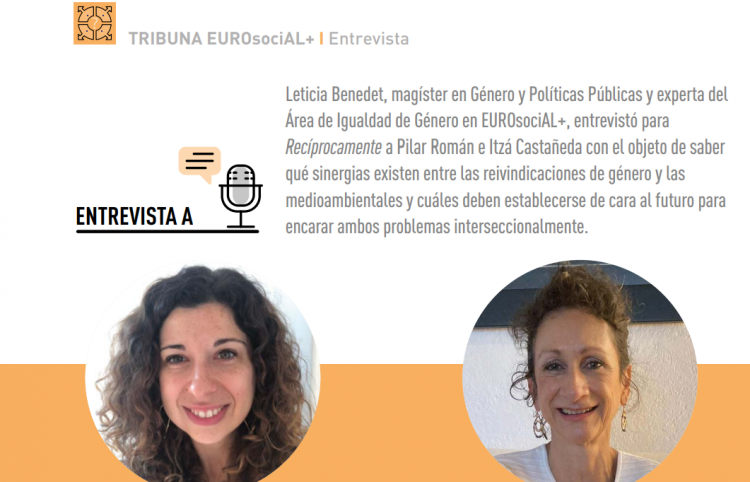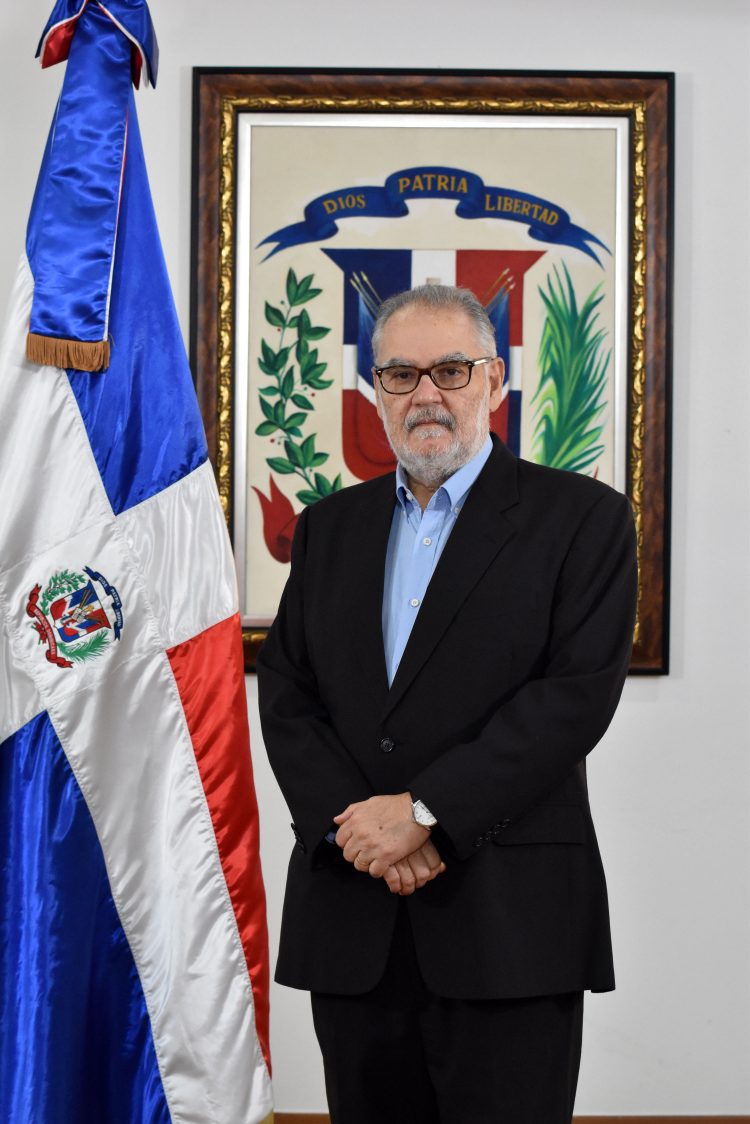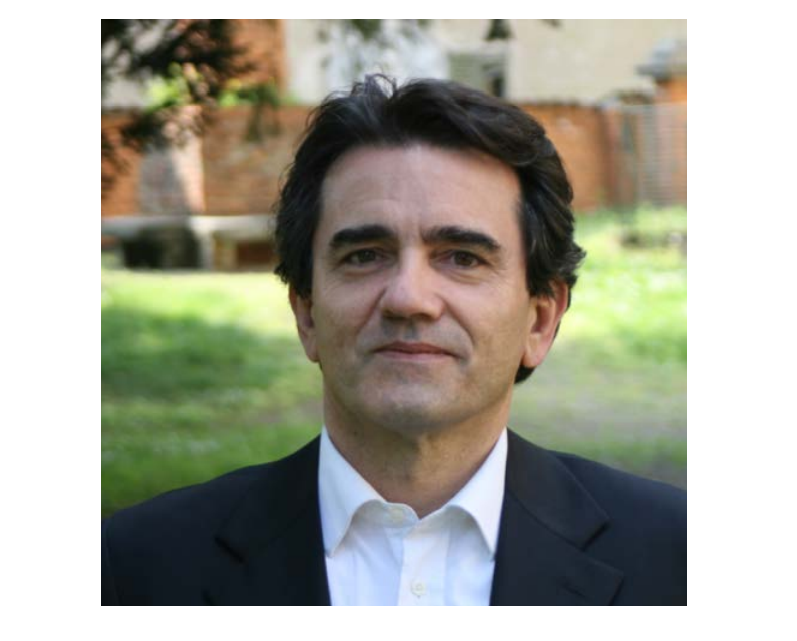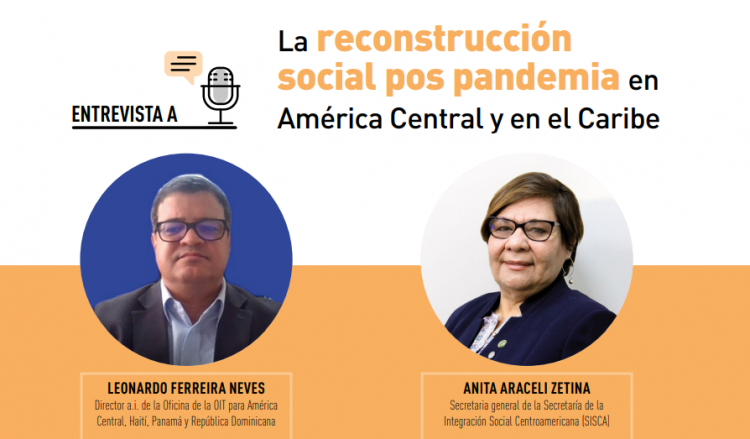Leticia Benedet, Master in Gender and Public Policy and expert in the Gender Equality Area at EUROsociAL+, interviewed Pilar Román and Itzá Castañeda for Recíprocamente to learn about the synergies between gender and environmental claims and which should be established in the future to address both issues intersectionally.

Which are the most recent and important collaboration milestones between Latin America, the Caribbean and Europe on the nexus between gender and climate change?
Pilar Roman: Both Europe and Latin America have been pushing the international gender and climate change agenda strongly. It is no coincidence that the first gender and climate change work programme of the United Nations Framework Convention for Climate Change (UNFCCC) was decided in Lima (Decision 18/CP. 20), nor that Latin American negotiators had a very important role in this achievement. Nor is it by chance that five years later, at the United Nations Conference on Climate Change 2019 (COP25), under the Chilean Presidency and with support from the Government of Spain – the country that hosted the COP, all the countries decided unanimously to make an improved version of this work programme and a five-year gender plan (Decision 3/CP. 25).
In 2020 and 2021, UN Women and the governments of Mexico and France worked on the creation of a global meeting for gender equality, the Generation Equality Forum, highlighting the creation of the Coalition for Action for Feminist Action for climate action[1], which has placed squarely on the global agenda the need to start the transition towards an inclusive green economy that recognises the interconnectedness of climate change and gender justice issues and that protects and amplifies the voices of indigenous communities
As an expert in the EUROsociAL+ Gender Area, you recently carried out a study on the state of the art of climate change policies with a gender perspective in Europe. If you had to choose the three European experiences that you consider good practices to replicate in LA, which would they be?
Pilar Roman: I would particularly highlight an experience related to women in the fishing sector. Latin America is making great strides in recognising the role of these women and guaranteeing their rights and equal access to benefits; however, I consider that the European experience in Spain, France and Finland, called “State of the collaborating spouse” (CSS), gives women a status that goes beyond supporting the family, treating them as professional workers with a voice in professional committees and organisations.
There are also regional strategies in the European Union that I consider valuable because of their coherence and coordination, and perhaps the Forum of Ministers of the Environment of Latin America and the Caribbean, together with its working group on gender that could be replicated. Among these strategies I would mention:
- The appointment of a dedicated commissioner[2] to integrate the equality perspective into all major EU policies and initiatives, particularly in the context of the Green Deal.
- The creation of a Gender Equality Strategy[3] that ensures the integration of gender in the policies of the member countries.
- The creation of a Social Climate Fund to support the citizens most affected by energy or mobility poverty and those who are most exposed to it. The goal is to mitigate costs for those most exposed to change, to ensure that the transition is fair and that no one is left behind.
As an Expert in the EUROsociAL+ Gender Area, you recently carried out a study into the State of the Art in climate change policies with a gender perspective in Latin America and the Caribbean. If you had to choose the three European experiences that you consider good practices to replicate in LA, which would they be?
Itzá Castañeda: I would highlight two: Firstly, the interministerial mechanisms on gender and climate change in which the sectors leading the mitigation and adaptation actions to climate change take part, the very mechanisms for gender equality, groups of women and young people, indigenous people, peasants and Afro-descendants, and LGTBI+ people. Based on this intersectionality, agendas are guaranteed to be plural and consensual, as well as pre-existing inequalities being addressed as part of climate actions (gender-responsive).
The other would have to do with internal climate displacements in Nationally Determined Contributions. Countries like Mexico have included this issue from a human rights and gender perspective. There are regional studies that provide empirical evidence and replicable analysis methodologies[4].
How can we ensure that the gender approach is included in climate action projects and programmes?
Itzá Castañeda: There is a consensus that gender-based violence and structural inequality hinder the ability of individuals and communities to adapt and mitigate the effects of climate change, as well as the ability to achieve peace and human security. In this regard, climate change poses great challenges that are mutually reinforcing and must be addressed intersectionally.
The actions supported by EUROsociAL+, such as the integration of data in agricultural censuses, women’s access to land, prevention and attention to gender-based violence, and the political and economic empowerment of women, are crucial to address the negative effects of climate change such as food insecurity linked to drought or loss of land and livelihoods.
EUROsociAL+, based on its expertise and close work with the MAMs, can play a catalytic role in the gender-responsive climate action strategies that the countries of the region have proposed and contribute to their effective implementation.
[1] See https://forum.generationequality.org/sites/default/files/2021-03/FACJ_FINAL_VISUAL_EN_0.pdf
[2] See https://ec.europa.eu/commission/commissioners/2019-2024/dalli_en
[3] See https://ec.europa.eu/info/policies/justice-and-fundamental-rights/gender-equality/gender-equality-strategy_es
[4] See https://www.cepal.org/en/publications/46737-advancing-gender-equality-environmental-migration-and-disaster-displacement



